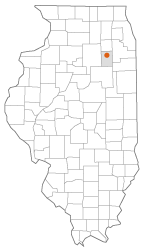Lithium Battery Fire and Community Financial Support in Grundy County, Illinois
What Happened

In the summer of 2021, the community of Grundy County, Illinois, experienced its fifth major disaster in just 8 years: a lithium battery fire burning hundreds of thousands of pounds of lithium-ion batteries. More than 200,000 lithium batteries exploded in an old Federal Paper Board facility, a 70,000-foot warehouse, causing toxic smoke and fumes. This fire forced the evacuation of some 3,000 residents from nearby homes.
Planning
Since this was Grundy County's fifth major disaster in the past 8 years, the planning stages had been set in stone by the time the fire erupted. The Community Foundation of Grundy County knew what work needed to be done and how to get individuals cash relief quickly. The Community Foundation of Grundy County operates by continuously soliciting donations from private citizens, whether or not a major disaster is present. This way, there is always immediate cash funding available for individuals living through crises.
Response
When the fire broke out, releasing toxic fumes into the air in the eastern portion of Morris, Illinois, located in Grundy County, the Community Foundation of Grundy County sprang into action. While many people were evacuated, the Community Foundation provided direct cash grants and labor assistance to individuals and families unable to leave the area. Their first-hand knowledge of the needs of the community allowed them to respond in a timely manner in the best way possible to help the people of their community.
Recovery
Being connected to various organizations and community leaders throughout its history, the Community Foundation of Grundy County can assist in many facets of recovery, mainly in helping provide financial support to those suffering from the outcomes of disasters. By working with, and providing cash grants to, small community nonprofits, the Community Foundation of Grundy County keeps an updated list of all of the resources in the community: they know who runs housing programs, transportation assistance, nutrition assistance, and more. Due to this knowledge, they not only can connect families and individuals to these resources but can also serve as a central connection point to convene community stakeholder conversations. By engaging with state and local leaders and community organizations, the Community Foundation of Grundy County can help lead and delegate tasks in the wake of future disasters.
Barrier
One Size Doesn't Fit All
Large, national organizations can often be very disconnected from the needs of rural areas. Urban areas do not always experience the same needs and response necessities as rural areas, so many one-size-fits-all approaches do not work. Some urban help is very compartmentalized, but not every person can perform every function in responding to a disaster. As such, help from organizations external to the community was not always in tune with the community's actual needs.
Lesson Learned
Prioritize Mental Health
The need for mental health services during a disaster led the Community Foundation of Grundy County to put out a call on their email distribution list consisting of clergy, local businesses, and others. A group of pastors from around the community answered the call and were able to provide mental health services. The realization was that smaller, community-based organizations could often fill the needs for a few weeks before the “big help” arrived.
Advice
Create a Community Organizations Activated in Disaster (COAD)
Create a Community Organizations Activated in Disaster (COAD). A COAD convenes local leaders of various community organizations to help plan for and assist in recovery from major disasters that may strike a community. Volunteer Organizations Activated in Disaster (VOAD) exist, but there can often be delays in their assistance response to disasters and public health emergencies. This is one area where being a rural organization helps; there are frequently fewer “turf wars” and duplication of response efforts. Each organization has its specialty and defines its area to attend in disaster response.
Coach and Educate Local Leaders
Help coach and educate local leaders who may serve limited terms in office about your community's existing public health emergency and disaster preparedness resources. With each new election, the individual leader's expertise may change, but the knowledge of the community organizations does not.
Person(s) Interviewed
Julianne Buck, Executive Director
Community Foundation of Grundy County
Opinions expressed are those of the interviewee(s) and do not necessarily reflect the views of the Rural Health Information Hub.
